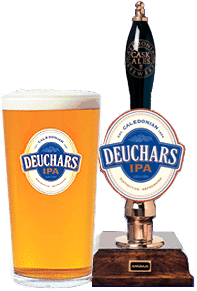| |
Long Live Caledonian Brewery?
by Willard Clarke, 07/04
Stephen Crawley was sporting a beauty of a black eye. Is that what happens when Scottish & Newcastle moves in and starts running your brewery?
Not quite. S&N; goes in for gentle arm-twisting rather than decking, and Steve, an accomplished cricketer who almost turned professional, copped a beamer on a damp wicket in an early season game in May.
The bruise will fade and die. But the changes at Caledonian - deeply shocking when they were announced in February - remain a worry.
On the surface, nothing has changed at the Edinburgh brewery. Caledonian still has the famous coppers heated by direct flame. It uses the finest malting barley and hops for its beers.
And Deuchar's IPA, the flagship brand that deservedly and belatedly won the Champion Beer of Britain accolade in 2002, remains a stunning ale, its resinous hoppiness balanced by juicy malt and tart fruit.
| Steve Crawley (right) is still the managing director and his team runs the show. But the harsh facts are these: since February, S&N; controls 30% of the shares and owns all the assets of the Caledonian Brewing Company.
Steve is bullish about the changes and the prospects for the company. But the nagging worries won't go away. S&N; has a track record of buying and closing breweries that is truly abysmal.
Back in the 1980s, when it bought Matthew Brown, it said the Blackburn brewery was "sacrosanct". It closed it a few years later, nevertheless, because its real interest all along had been to control Brown's subsidiary, Theakston's, as S&N; badly needed some strong ale brands in its flagging portfolio. |
|

|
Since then, S&N; has closed the Home Brewery in Nottingham, Webster's in Halifax, and the historic George's Brewery in Bristol. As it owns Kronenbourg, a major European lager brand, its interest in ale has waned. It sold Theakston's back to the family and a cynic might conclude that the stake in Caledonian is more to do with keeping a foothold in Scotland when it closes the Fountain Brewery at the end of the year than with any deep, abiding love of the ale market.
Steve sees it differently. "The deal gives Caley a future," he said. "Some of our shareholders wanted to sell their stake and we needed a solution."
The whole company was sold to Scottish Courage, S&N;'s brewing arm, and then the Caley management bought back the British rights to the brands, the recipes and how the beers are brewed, while ScotCo own the international rights.
"ScotCo wanted to own everything," Steve added, "but four Caley directors control 70% of the shares and we can't be sacked. Neither can the site be sold without the agreement of a majority of the directors."
Two Edinburgh entrepreneurs, George Lorimer and Robert Clark, launched the brewery in 1869 at a time when Edinburgh was home to 41 breweries. Lorimer & Clark drew on brewing water from the "charmed circle" of wells beneath the city, water that is as hard and flinty as Burton-on-Trent's and ideally suited to brewing the new pale ales of the day.
Paradoxically, Lorimer & Clark's success came not from pale ale but from soft and malty Scotch Bitter that was exported via the Caledonian Railway alongside the brewery to the North-east of England. The clamour for Scotch Bitter on the Tyne and the Wear led to the company being bought in 1919 by Vaux of Sunderland.
By the 1980s, the decline of industry in the North-east saw a sharp fall in demand for Scotch and Vaux announced in 1987 that it planned to close Lorimer & Clark. It was saved by a buy-out led by Russell Sharp, who had run the Chivas Regal whisky company, and Dan Kane, CAMRA's Scottish Organiser. Before Dan died tragically from leukaemia, he fashioned with Russell a portfolio of traditional Scottish beers. Together they put the renamed Caledonian on the map by stressing the historic importance of the site and its brewing methods, and organising regular beer festivals at the brewery.
Russell Sharp has now retired, though he is involved in the new Innis & Gunn brewery in Edinburgh with his son, Dougal, the former head brewer at Caley. Robert Burton, an experienced brewer who came to Scotland following the closure of the Mansfield Brewery, has replaced Dougal.
Donald MacDonald and Sandy Orr, who are hoteliers and founding directors of Caley when Russell Sharp and Dane Kane came to the rescue, control 51% of the shares. Steve Crawley and his Director of Corporate Development, Denis Critchley-Salmonson, share the remaining 19% of the independent directors' 70% stake.
While some will remain nervous that S&N; could suggest to MacDonald and Orr that a hotel in Slateford Road would be a more profitable option than a brewery. Steve Crawley is full of optimism for the future, but says that Caley must grow outside Scotland.

|
|
The cask beer market in
Scotland is tiny, and 75% of cask is sold in Edinburgh. Since it won the Champion Beer of Britain award, sales of Deuchar's IPA have doubled
and it now accounts for 65% of Caley's production (50,000 barrels a year). Steve wants that to grow to 80%, and thinks production can be dramatically boosted with additional
fermenting capacity - which S&N; would have to pay for. The brewery capacity is 100,000 barrels.
"There's a resurgence of cask beer in Britain," he said. "The majority of pubs in the Good Beer Guide sold more cask beer this year than last."
Caley has broken into the difficult Glasgow market and is making a big play for England. Deuchar's is a major brand throughout the Wetherspoon's estate, the specialist Midlands Tynemill pub company takes the beer, while York pubs sell nearly as much Deuchar's as Edinburgh's. |
But London is the centre of Steve's attention. He is desperate to build sales in the England capital and the rest of the South-east, at the same time as he also develops the bottled side of the business.
"ScotCo sells one million barrels of beer a year to Tesco," he pointed out, "and I would like to sell 100,000 barrels of Deuchar's to the supermarket."
Is Caley supping dangerously with S&N; and using a short spoon? A display in the brewery's museum has, inevitably, an extract from a poem by Robert Burns:
"Oh, gude ale comes and gude ale goes,
Gude ale gars me sell my hose,
Sell my hose and pawn by shoon,
Gude ale keeps my heart aboon."
Lets hope the link with S&N; doesn't lead to Steve Crawley and his colleagues losing their shoon, let alone their troosers.
|
|

